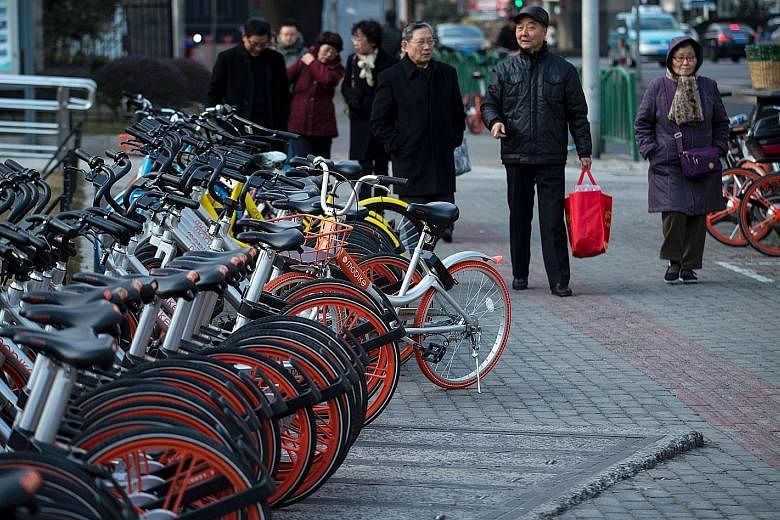SHANGHAI • Unlock them with an app, drop them off anywhere, and zip past lanes of stationary car traffic: The humble bicycle is seeing a revival in China as a new generation of start-ups helps tackle urban congestion and pollution with fleets of brightly coloured two-wheelers.
The bike-share concept has attracted huge venture capital as fledgling firms wrestle for market share.
Such has been the success of this made-in-China business model, which is using smartphones to reignite the nation's passion for cycling, that companies are hatching plans to export the idea worldwide.
"We are focused on how to make the small bicycle have a big impact," said Mr Davis Wang, chief executive of Mobike, which launched last April in Shanghai and already has several hundred thousand of its silver-and-orange "smart" bikes in 13 Chinese cities.
Key players Mobike, Ofo and others are tapping the sharing economy ethic behind Airbnb and ride-hailing apps such as Uber, and targeting China's 700 million mobile phone users, who increasingly use their devices for transactions.
-
Hunters report rule-breakers
-
BEIJING • Users of the shared-bicycle projects can now leave their GPS-equipped bicycles anywhere they like. There are no designated "stations" to which the bikes must be returned.
This set-up is convenient but can easily be exploited, reported news website Sixth Tone.
What if users take the bikes home or use personal locks to prevent others from using them? That's where the so-called bike hunters come in.
They are shared-bike enthusiasts who have made a game of reporting improperly parked bicycles. Using their smartphones, the bike hunters will locate the missing bicycles in their neighbourhoods and report the infractions to either the companies or municipal governments.
Users caught breaking the rules will have points deducted from their credit scores, while hunters will be rewarded with extra points.
Said bike hunter Zhuang Ji: "Once you play the game, you get addicted - it's even better than Pokemon Go because it's real."
Customers use the firm's app to release a bike's lock for rides costing as little as 1 yuan (20 Singapore cents) an hour. Bikes can be left anywhere for the next user.
Mobike's app also shows where idle bikes are, while both companies capture rider data that they say can help in traffic planning.
"If we can persuade hundreds of thousands of people in every city to start to reuse bikes every day, then we can create a social impact for every city," said Mr Wang.
Once emblematic of China's masses, bikes lost ground as economic growth and urban sprawl fuelled consumer demand for cars.
Cities gridlocked by traffic and deteriorating air quality have prompted both government and consumers to search for greener solutions.
Industry evangelists say the new approach to bike sharing can solve the "first mile/last mile" problem that has long plagued urban planners: how to move commuters between their homes and public transit. The inconvenience of travelling to a bus stop or metro station can be enough of a psychological barrier to push commuters towards taxis or car ownership.
"In places where the subway does not extend, where it's difficult to change from one kind of transport to another, it's so easy to get where you want to go with Mobike," said Ms Hu Hong, 29, who pedals to her Shanghai real-estate job.
Some Chinese cities started municipal bike-rental schemes years ago that allow users to pick up and drop off their wheels at designated stations, similar to hundreds of programmes around the world.
Today's start-ups have removed that shackle, and the convenience of being able to drop off anywhere means a new generation of riders is now ubiquitous in cities such as Shanghai and Beijing.
Ofo, which launched in 2015 as a Peking University student project, claims 10 million users for its one million bright yellow bikes in 33 cities. It plans to add 10 million to 15 million bikes this year, said chief operating officer Zhang Yanqi.
Eager to cash in, Chinese and foreign investors have handed Mobike and Ofo hundreds of millions of dollars.
China's government singled out Mobike and Ofo last month - praising bike-sharing as a means of cutting emissions and traffic.
Ofo launched in Singapore in recent weeks, and is now eyeing the United States and European markets. Mobike plans to enter Singapore within weeks.
AGENCE FRANCE-PRESSE

